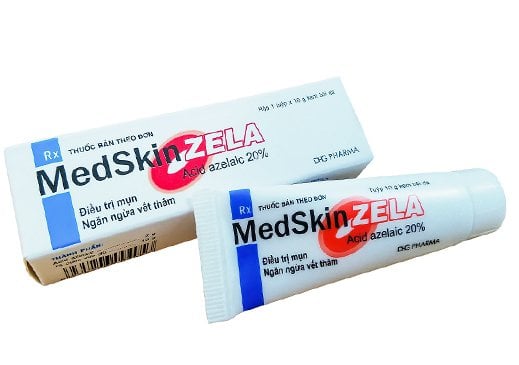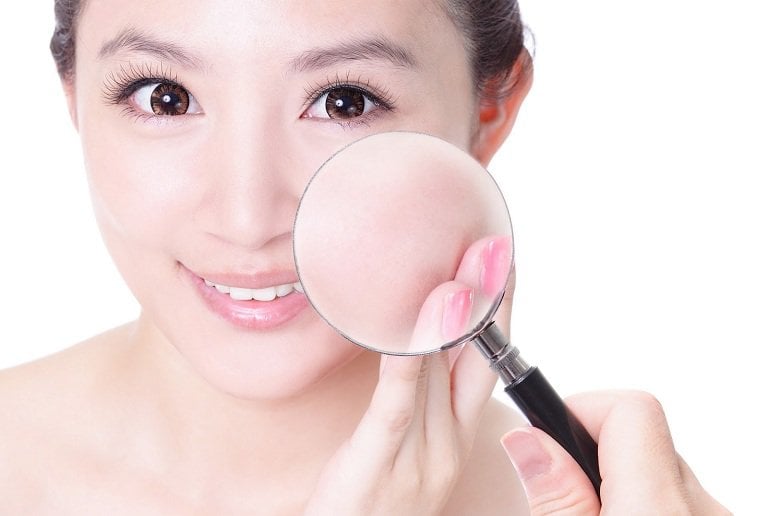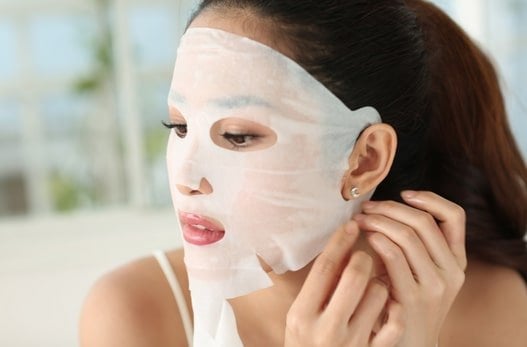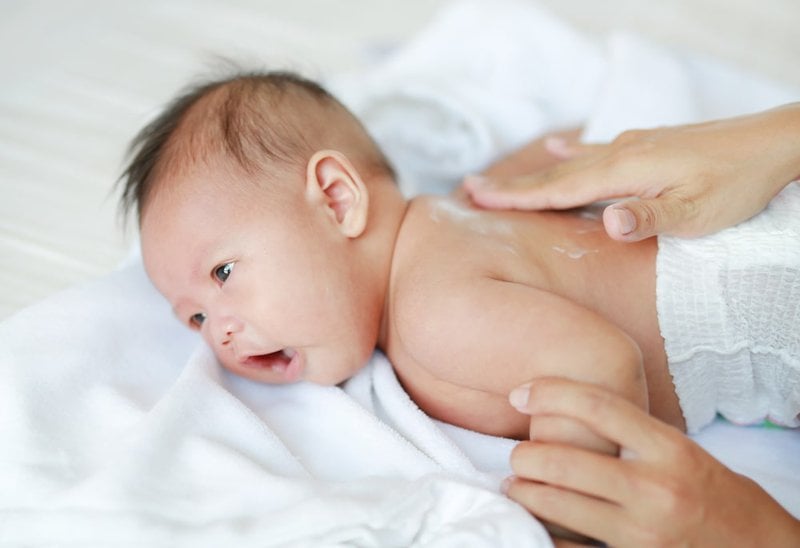Causes of acne on the nose and how to treat it
This is an automatically translated article.
The nose is one of the most prone to acne, because the pores on the nose are often larger than other areas, so they are also more prone to blockage. This can form large, red bumps on the nose.
1. Types of acne in the nose
Not all nose pimples are created equal. Before trying to treat acne on the nose, you need to determine if it is common acne or rosacea. After determining the exact cause of acne on the nose, you can choose a more precise treatment method.
It can be difficult to distinguish between normal acne and rosacea because they have similar symptoms, both of which can appear on the nose. However, they have a fundamental difference: Common acne refers to pimples, blackheads, cysts, and other forms of acne. Whereas, rosacea is of rosacea. A person can have both acne and rosacea at the same time.
You can tell the difference between normal acne and rosacea by reassessing your skin condition. Specifically:
Common acne is related to clogged pores, with symptoms including: Swollen acne nodules, possibly pus, blackheads, whiteheads. Deeply clogged pores can cause cystic acne or pustules - causing swelling, which is painful to the touch. If you have acne on your nose, you can also get acne elsewhere on your face, like your chin or forehead, or on other parts of your body; Rosacea: Excessive redness and widespread swelling appear. These symptoms can start on the nose, spreading to nearby areas of the face, such as the cheeks. The nose may become enlarged due to inflammation. Eventually, pimples may emerge above the reddened skin. SEE ALSO: Treating adult acne
It can be difficult to distinguish between normal acne and rosacea because they have similar symptoms, both of which can appear on the nose. However, they have a fundamental difference: Common acne refers to pimples, blackheads, cysts, and other forms of acne. Whereas, rosacea is of rosacea. A person can have both acne and rosacea at the same time.
You can tell the difference between normal acne and rosacea by reassessing your skin condition. Specifically:
Common acne is related to clogged pores, with symptoms including: Swollen acne nodules, possibly pus, blackheads, whiteheads. Deeply clogged pores can cause cystic acne or pustules - causing swelling, which is painful to the touch. If you have acne on your nose, you can also get acne elsewhere on your face, like your chin or forehead, or on other parts of your body; Rosacea: Excessive redness and widespread swelling appear. These symptoms can start on the nose, spreading to nearby areas of the face, such as the cheeks. The nose may become enlarged due to inflammation. Eventually, pimples may emerge above the reddened skin. SEE ALSO: Treating adult acne
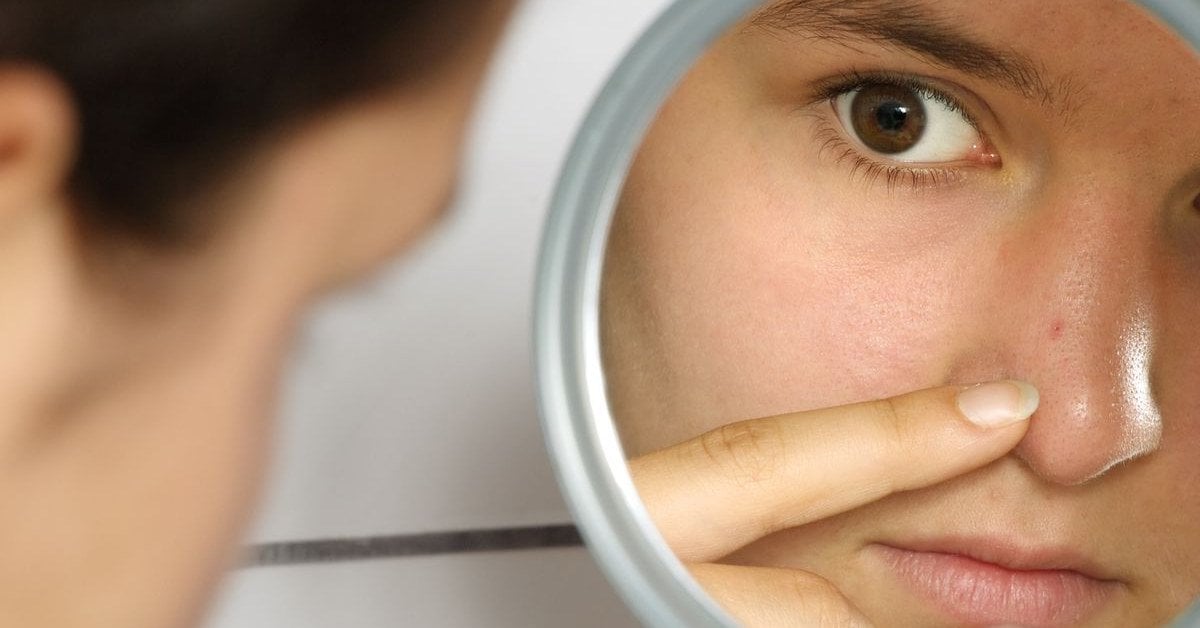
Mũi là vị trí dễ xuất hiện mụn trứng cá
2. Causes of acne in the nose
Once you have identified the type of acne you are experiencing, you need to know the cause of the acne to have the appropriate treatment.
2.1 Common causes of acne Acne occurs when pores become clogged. Pores when secreting too much sebum, combined with dead skin, dirt or bacteria will form acne. The nose is especially prone to acne because the pores on the nose are often larger than in other areas.
The location of acne on the nose can also tell about your health condition. For example, acne on the tip of the nose is a sign of digestive problems. Acne on both sides of the nose is related to hormone fluctuations. And acne inside the nose can be caused by waxing or blowing the nose.
2.2 Causes of rosacea Rosacea is caused by enlarged, visible blood vessels. The inflammation that causes redness on the skin will not go away on its own. Bumps on the skin that resemble acne may appear. This condition is not the same as normal acne and not the acne that causes rosacea.
Factors such as environmental influences, factors that cause inflammation of the blood vessels or long-term UV exposure, ... are considered to be the causes of rosacea.
2.1 Common causes of acne Acne occurs when pores become clogged. Pores when secreting too much sebum, combined with dead skin, dirt or bacteria will form acne. The nose is especially prone to acne because the pores on the nose are often larger than in other areas.
The location of acne on the nose can also tell about your health condition. For example, acne on the tip of the nose is a sign of digestive problems. Acne on both sides of the nose is related to hormone fluctuations. And acne inside the nose can be caused by waxing or blowing the nose.
2.2 Causes of rosacea Rosacea is caused by enlarged, visible blood vessels. The inflammation that causes redness on the skin will not go away on its own. Bumps on the skin that resemble acne may appear. This condition is not the same as normal acne and not the acne that causes rosacea.
Factors such as environmental influences, factors that cause inflammation of the blood vessels or long-term UV exposure, ... are considered to be the causes of rosacea.
3. How to treat acne
There is a difference between inflammatory and non-inflammatory acne treatments. Specifically:
3.1 How to treat non-inflammatory acne Non-inflammatory acne is small pimples, blackheads, and whiteheads. Most cases of non-inflammatory acne can be easily treated with toners, acne creams, and topical treatments that kill bacteria and remove excess oil and cells. dry skin. Squeezing pimples on the nose is not recommended.
Products containing salicylic acid will work well in treating this type of acne. Salicylic acid removes excess dead cells around hair follicles, helping to prevent and treat acne. It is considered the most popular beta hydroxy acid (BHA) exfoliant. In addition, alpha hydroxy acid (AHA) exfoliants such as glycolic acid can also unclog pores and reduce the appearance of dark spots and freckles. Retinoids also work to help unclog clogged pores.
3.2 How to Treat Inflammatory Acne Inflammatory acne is the most severe form of acne, it usually manifests as a nodule, swelling around the nodule. Home remedies and the use of certain products can help treat inflammatory acne if it only appears occasionally. Specifically, applying ice reduces inflammation and using warm towels to squeeze out oil and pus from deep under the skin.
OTC acne patches also have a similar effect in treating inflammatory acne. Topical treatments containing the ingredient benzoyl peroxide also help reduce inflammation and reduce the swelling caused by acne. OTC retinoids also work quite well.
For severe inflammatory acne on the nose, recurrent inflammatory acne, you may need to see a dermatologist for prescription acne treatment. Your doctor may prescribe antibiotics to reduce severe boils and cysts and reduce inflammation. Certain prescription retinoids such as isotretinoin (Accutane) also help treat inflammatory acne, because it has the ability to shrink the sebaceous glands. However, isotretinoin can have serious side effects, so you need to use it exactly as prescribed by your doctor.
3.1 How to treat non-inflammatory acne Non-inflammatory acne is small pimples, blackheads, and whiteheads. Most cases of non-inflammatory acne can be easily treated with toners, acne creams, and topical treatments that kill bacteria and remove excess oil and cells. dry skin. Squeezing pimples on the nose is not recommended.
Products containing salicylic acid will work well in treating this type of acne. Salicylic acid removes excess dead cells around hair follicles, helping to prevent and treat acne. It is considered the most popular beta hydroxy acid (BHA) exfoliant. In addition, alpha hydroxy acid (AHA) exfoliants such as glycolic acid can also unclog pores and reduce the appearance of dark spots and freckles. Retinoids also work to help unclog clogged pores.
3.2 How to Treat Inflammatory Acne Inflammatory acne is the most severe form of acne, it usually manifests as a nodule, swelling around the nodule. Home remedies and the use of certain products can help treat inflammatory acne if it only appears occasionally. Specifically, applying ice reduces inflammation and using warm towels to squeeze out oil and pus from deep under the skin.
OTC acne patches also have a similar effect in treating inflammatory acne. Topical treatments containing the ingredient benzoyl peroxide also help reduce inflammation and reduce the swelling caused by acne. OTC retinoids also work quite well.
For severe inflammatory acne on the nose, recurrent inflammatory acne, you may need to see a dermatologist for prescription acne treatment. Your doctor may prescribe antibiotics to reduce severe boils and cysts and reduce inflammation. Certain prescription retinoids such as isotretinoin (Accutane) also help treat inflammatory acne, because it has the ability to shrink the sebaceous glands. However, isotretinoin can have serious side effects, so you need to use it exactly as prescribed by your doctor.
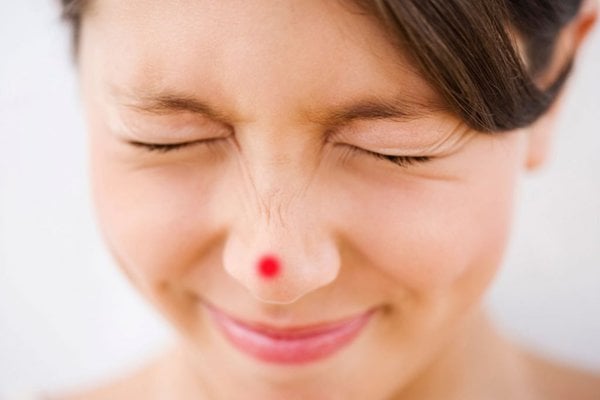
Có sự khác nhau trong cách điều trị giữa mụn viêm và mụn không viêm
4. How to treat rosacea
Acne rosacea is a sensitive skin condition that requires medical treatment. Home remedies do not treat this condition. Therefore, the patient needs to see a doctor for an appropriate treatment plan.
4.1 Medication The doctor may prescribe brimonidine (Alphagan P) to reduce inflammation and redness. The medication helps to constrict blood vessels, and over time it also improves any acne that has developed.
In addition, the doctor can also prescribe the patient to use drugs that help reduce acne immediately caused by rosacea. Antibiotics are often used temporarily for inflammatory acne. Other ingredients such as metronidazole and azelaic acid will be used long term.
In case the above drugs are not effective, the patient may be prescribed by the doctor to use isotretinoin as a last resort.
4.2 Other treatments Several other therapies are also used in conjunction with medication to treat rosacea, specifically:
Dermabrasion and dermabrasion used to remove skin cells death leads to acne; Stress reduction techniques such as meditation and massage can help reduce underlying inflammation; Laser therapy can reduce redness in the skin. SEE ALSO: Acne skin care: Do's/don'ts
4.1 Medication The doctor may prescribe brimonidine (Alphagan P) to reduce inflammation and redness. The medication helps to constrict blood vessels, and over time it also improves any acne that has developed.
In addition, the doctor can also prescribe the patient to use drugs that help reduce acne immediately caused by rosacea. Antibiotics are often used temporarily for inflammatory acne. Other ingredients such as metronidazole and azelaic acid will be used long term.
In case the above drugs are not effective, the patient may be prescribed by the doctor to use isotretinoin as a last resort.
4.2 Other treatments Several other therapies are also used in conjunction with medication to treat rosacea, specifically:
Dermabrasion and dermabrasion used to remove skin cells death leads to acne; Stress reduction techniques such as meditation and massage can help reduce underlying inflammation; Laser therapy can reduce redness in the skin. SEE ALSO: Acne skin care: Do's/don'ts
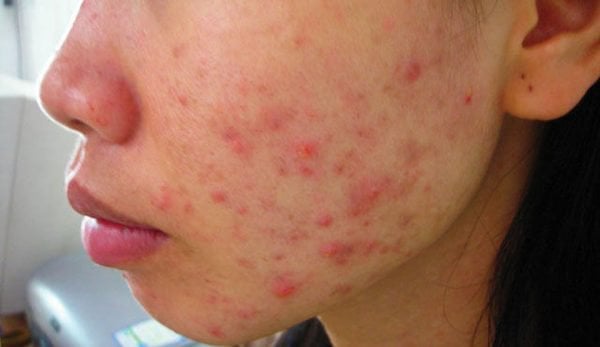
Mụn trứng cả đỏ cần được điều trị y tế
5. How to prevent acne
Maintaining a proper skin care routine is the key to having clean skin, removing excess oil, and preventing nose breakouts. Some notes that you should do include:
Wash your face twice a day gently with a gel cleanser; Use the right moisturizer for your skin type. This ensures that the skin is properly moisturized, the sebaceous glands are not overactive, and do not produce a lot of acne-causing oil; Apply clay mask with frequency 1-2 times/week. This helps unclog the pores on the nose and helps to shrink the pores; Wear sunscreen every day because sun exposure not only increases your risk of skin cancer and wrinkles, but it can also dry out your skin, increase oil production in your pores, and cause breakouts. Rosacea is well controlled by treating the disease. Medications prescribed by your doctor can prevent flare-ups of rosacea. However, traditional acne treatments can make rosacea worse. Therefore, you need to consult a doctor before applying any acne treatment method.
Wash your face twice a day gently with a gel cleanser; Use the right moisturizer for your skin type. This ensures that the skin is properly moisturized, the sebaceous glands are not overactive, and do not produce a lot of acne-causing oil; Apply clay mask with frequency 1-2 times/week. This helps unclog the pores on the nose and helps to shrink the pores; Wear sunscreen every day because sun exposure not only increases your risk of skin cancer and wrinkles, but it can also dry out your skin, increase oil production in your pores, and cause breakouts. Rosacea is well controlled by treating the disease. Medications prescribed by your doctor can prevent flare-ups of rosacea. However, traditional acne treatments can make rosacea worse. Therefore, you need to consult a doctor before applying any acne treatment method.
Please dial HOTLINE for more information or register for an appointment HERE. Download MyVinmec app to make appointments faster and to manage your bookings easily.
Reference source: healthline.com
This article is written for readers from Sài Gòn, Hà Nội, Hồ Chí Minh, Phú Quốc, Nha Trang, Hạ Long, Hải Phòng, Đà Nẵng.

